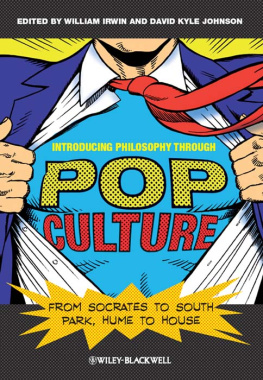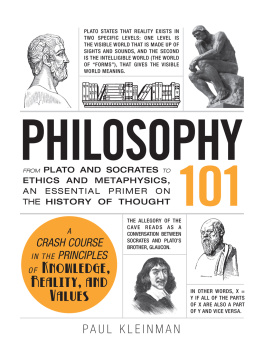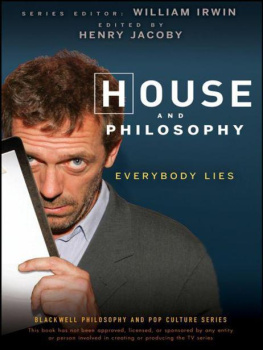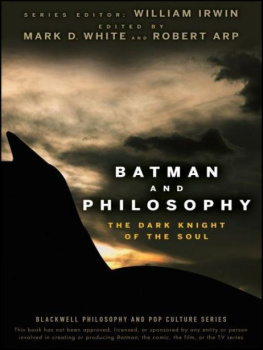Contents
Introducing Philosophy through Pop Culture
This edition first published 2010
2010 John Wiley & Sons Inc. except for editorial material and organization
2010 William Irwin and David Kyle Johnson
Blackwell Publishing was acquired by John Wiley & Sons in February 2007. Blackwells publishing program has been merged with Wileys global Scientific, Technical, and Medical business to form Wiley-Blackwell.
Registered Office
John Wiley & Sons Ltd, The Atrium, Southern Gate, Chichester, West Sussex, PO19 8SQ, United Kingdom
Editorial Offices
350 Main Street, Malden, MA 02148-5020, USA
9600 Garsington Road, Oxford, OX4 2DQ, UK
The Atrium, Southern Gate, Chichester, West Sussex, PO19 8SQ, UK
For details of our global editorial offices, for customer services, and for information about how to apply for permission to reuse the copyright material in this book please see our website at www.wiley.com/wiley-blackwell .
The right of William Irwin and David Kyle Johnson to be identified as the authors of the editorial material in this work has been asserted in accordance with the UK Copyright, Designs and Patents Act 1988.
All rights reserved. No part of this publication may be reproduced, stored in a retrieval system, or transmitted, in any form or by any means, electronic, mechanical, photocopying, recording or otherwise, except as permitted by the UK Copyright, Designs and Patents Act 1988, without the prior permission of the publisher.
Wiley also publishes its books in a variety of electronic formats. Some content that appears in print may not be available in electronic books.
Designations used by companies to distinguish their products are often claimed as trademarks. All brand names and product names used in this book are trade names, service marks, trademarks or registered trademarks of their respective owners. The publisher is not associated with any product or vendor mentioned in this book. This publication is designed to provide accurate and authoritative information in regard to the subject matter covered. It is sold on the understanding that the publisher is not engaged in rendering professional services. If professional advice or other expert assistance is required, the services of a competent professional should be sought.
Library of Congress Cataloging-in-Publication Data
Introducing philosophy through pop culture : from Socrates to South Park, Hume to House / edited by William Irwin and David Kyle Johnson.
p. cm.
Includes bibliographical references and index.
ISBN 978-1-4443-3453-1 (pbk.)
1. Philosophy and civilization. 2. Popular culturePhilosophy. I. Irwin, William, 1970II. Johnson, David Kyle.
B59.I59 2010
100dc22
2010016191
A catalogue record for this book is available from the British Library.
Acknowledgments
We would like to thank our friends and colleagues who offered feedback and advice in assembling this volume, especially Dave Baggett, Greg Bassham, and Jason Eberl. We would also like to thank Andrew Morton for permission to use his glossary definitions. Thanks are also due to Jeff Dean and a bevy of anonymous reviewers who helped us shape the volume. Kyle wishes to thank his wife Lori for her love and support. Bill wishes to thank his wife Megan and his children Daniel and Kate for making home so happy and philosophy-friendly.
Introduction
Philosophy has a public relations problem. Just the sound of the word philosophy scares a lot of people, conjuring images of long-dead Greeks and crusty old professors. But the stereotypes of philosophy are just that stereotypes. They are mistaken exaggerations and overgeneralizations. Western Philosophy may have begun in Ancient Greece, but it is alive and well in contemporary America and around the globe. Some philosophy professors may be egg-headed, ivory tower intellectuals, but most are not. In fact, many philosophy professors like the same things you like: television, movies, music, and video games. We see connections between these elements of pop culture and philosophy. So this book, written by philosophy professors, takes you from pop culture to philosophy; we wade into the shallow water before swimming out deep. Each chapter focuses on a piece of pop culture, like Harry Potter or The Office, and teaches you about a particular issue in philosophy or the views of a particular philosopher. We think youll agree that, to paraphrase a classic Disney truism, a spoonful of pop culture helps the philosophy go down.
The idea of using examples to facilitate learning is not new to philosophy. Famously, Plato (429347 BCE) used the story of the ring of Gyges, and Descartes (15961650) imagined a deceitful demon. However, most examples in philosophy are rather dry finding people with bland names like Jones and Brown in difficult to describe circumstances, such as those in which we are potentially justified in believing that Jones owns a Ford, or Brown is in Barcelona. Thankfully, Hollywood writers do a much better job of creating engaging, imaginative scenarios than philosophers do. So why not use their creations to add spice to philosophy? As youll discover in this book, The Matrix provides a vivid way of picturing Descartes concerns about deception and knowledge, and South Park hilariously dramatizes the problem of evil by asking why good things (like inheriting a million dollars) happen to bad people (like Cartman). Indeed, many other insightful philosophical illustrations from pop culture await your reading.
Now, of course, you may be concerned that youre in trouble because in addition to being clueless about philosophy youre also clueless about The Matrix and South Park. Theres no need to worry. You dont have to be an expert on Batman or to have seen every episode of House to benefit from this book. Even a passing acquaintance with the pop culture icon discussed in any given chapter will be enough for you to learn the philosophy to which it is connected. You can get that easily enough on the Internet. In fact, you can visit the website for this book at www.pop-philosophy.org for all kinds of helpful up-to-date links.
In sum, this book is intended to make initial connections between pop culture and philosophy that will pique your interest in the latter and lead you to study and appreciate the subject more deeply. Maybe youll even decide to tell your friends that philosophy has gotten a bad rap. Certainly, we believe youll find that philosophy is relevant, fun, and exciting.
How to Use this Book in a Philosophy Course
This book is intended to serve primarily as a supplementary text in Introduction to Philosophy courses. Introductory courses are structured in a variety of different ways depending on the professor. Some courses are questions and issues based, some are historically based. Some courses use a standard textbook; others rely on primary philosophical texts. Others mix it up and use a combination of approaches. This book is designed to go along with any of them. However, this book is not intended to cover all philosophical issues and figures in exhaustive detail. We leave that for the main text and the professor.
This book can be used in a variety of ways in the classroom. Its chapters can be used to introduce a philosophical topic unfamiliar to the student. Assigning a summary of the chapter can ensure the student reads it and is better prepared for a lecture on the topic of the chapter. Each chapter could also be used for philosophical reflection; you might consider having your students write reflection or argument papers in response to them. If you are worried about whether your students are familiar with the relevant pop culture phenomena, there is a wiki site for each pop culture phenomenon discussed (e.g., heroeswiki.com ) that can provide a quick and easy summary. Other suggestions for professors on how to use this book in courses are available at www.pop-philosophy.org .












